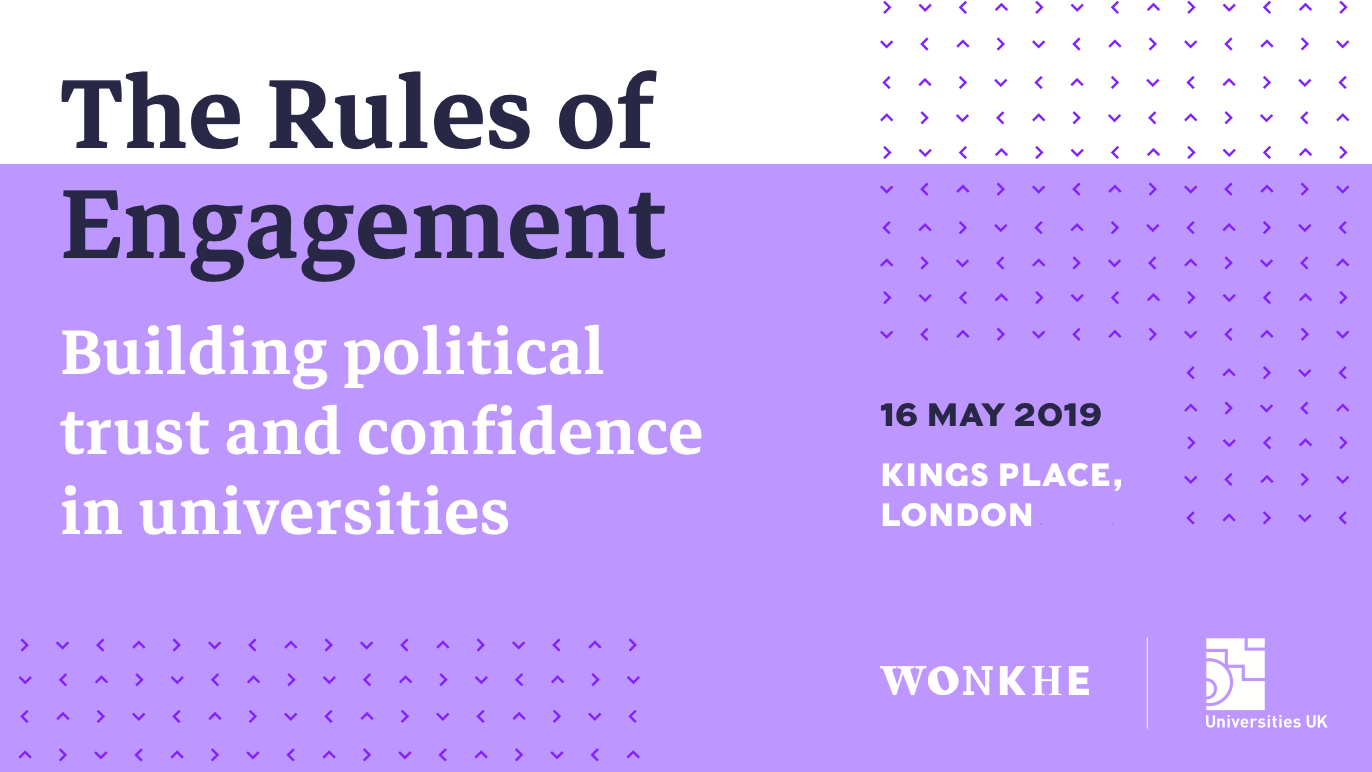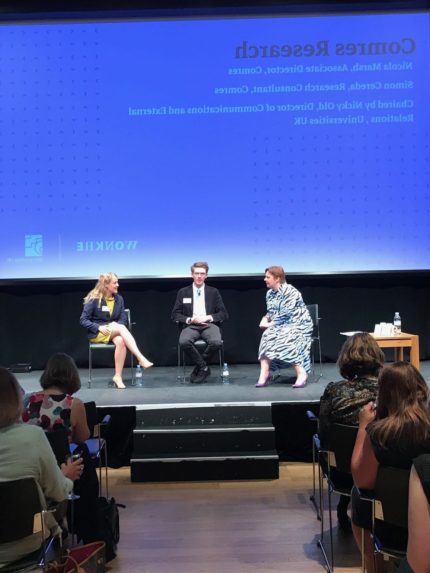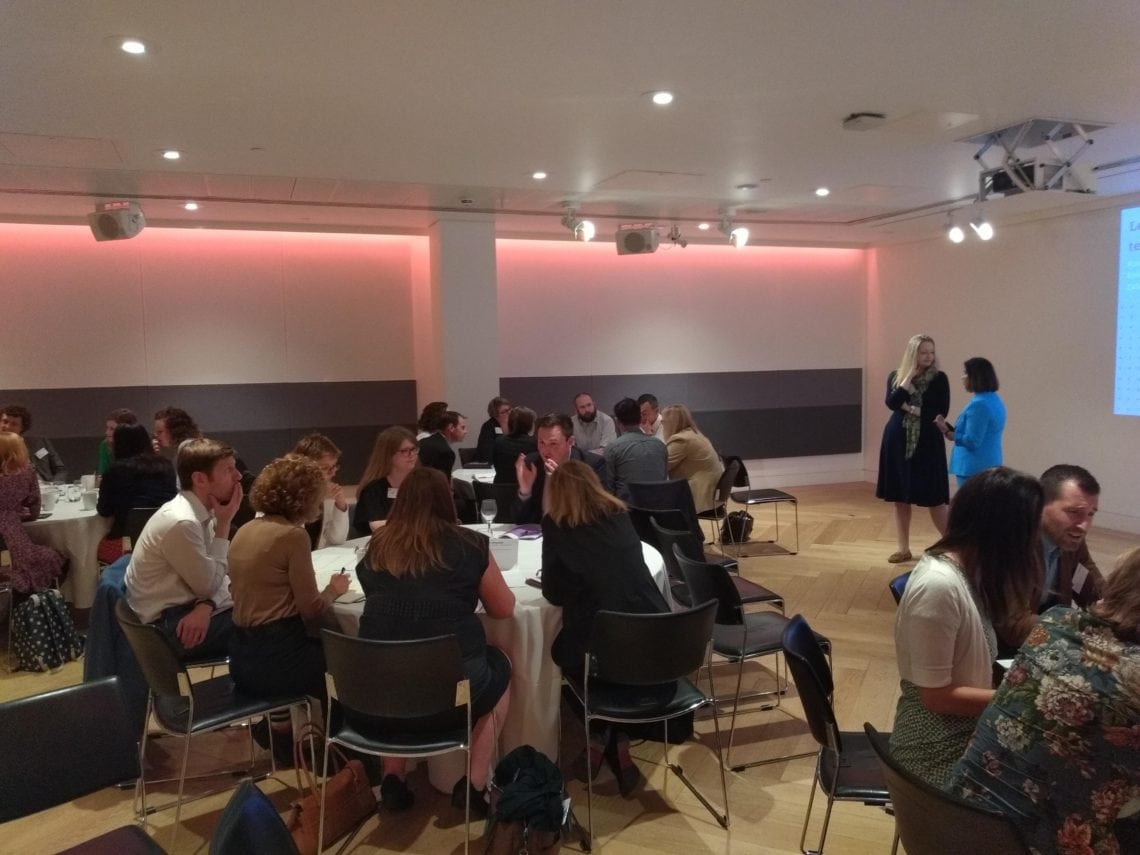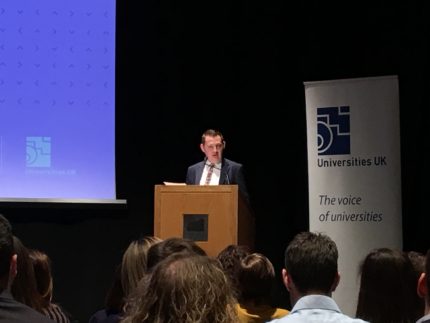
Here is our live blog of all the action as it happens from Wonkhe and Universities UK’s The Rules of Engagement event, Thurs 16 May at Kings Place, London.

Here is our live blog of all the action as it happens from Wonkhe and Universities UK’s The Rules of Engagement event, Thurs 16 May at Kings Place, London.
Tim Bale, Professor of Politics at Queen Mary, University of London, opens with the confession that he has forgotten his crystal ball and therefore won’t be able to predict the future political landscape for us. Instead he delved into current times.
Tim explored the divides that are reflected in our society today, identifying people’s “leave or remain” identities as more salient than people’s traditional party affiliation. He also explained the importance of “Diploma democracy”, which refers to the divide between people who have degrees and those who don’t. It’s not all about divides, however – there are some similarities: the post-Brexit polling suggests things have been bad for the Conservatives, but they’ve also been bad for Labour.
To generalise, Labour is pulling more people from the educated or education classes, and the Conservative Party tends to pull more people from backgrounds where they are less so. Labour tends to do better in urban areas and the Conservatives tend to do better in sub-urban areas. Tim concluded: “Demographically and geographically, I don’t think things have changed much.”
On the Brexit question, Tim highlighted a tendency among universities to appear as islands of Remain-voters in cities that do not reflect the same intention, and this can give off an impression of distance. As Tim said, it’s important for universities to tackle that impression.
Our apologies. We were so immersed in this discussion from earlier in the day, that we forgot to blog about it!
In the morning, Rachel Wolf from Public First and Lord Bassam of Brighton came together in a lively conversation with the vice-chancellor of London Southbank University, David Phoenix to discuss how the sector creates change in a heavily contested political territory.
Both Rachel and Lord Bassam began by highlighting the need for universities to promote their value. For Rachel, this meant stressing their contributions to their local regions and communities. And for Lord Bassam, he believes that the present time affords an opportunity to position universities as the gateway into an open, inclusive world. He said that this is particularly needed during what is considered a hostile Brexit environment.
Rachel encouraged the sector to look to schools who she believed had done a better job at lobbying for money and the attention of politicians than universities. The key to their success. Parents and families. She went on to describe that there is a lesson here for universities to better leverage students, families, and the wider community in their advocacy and change efforts.
When put the question about the types of relationships and allies that universities need to find solidarity with, Bassam spoke passionately about the need to involve business. “Businesses should be deeply embedded within the governance structures of an institution.” He pointed to various examples, including the Warwick Manufacturing Group, and the innovation centres at the University of Sussex as examples of businesses working with universities to generate economic value. Rachel highlighted the important role that businesses play as employers and the importance of ensuring businesses work with universities to prosecute the underinvestment in areas such as lifelong learning with politicians.
Rounding out this interesting discussion was a focus on the need to equally value the contribution of both arts, as well as STEM disciplines to the community. David Phoenix called to move beyond the contribution of disciplines and subjects in silos, but integrated approaches that are needed to solve the complex challenges faced by society.
Universities are in the business of changing lives.
Save the Children’s, Executive Director of Policy, Advocacy and Campaigns, Kirsty McNeill began with this statement as a reminder for universities to reflect on what makes them great, and to leverage their strengths in the way they forge coalitions, communicate with politicians, and in the change they seek to create.
She shared five principles for the sector to consider in the way it wishes to exert influence with politicians:

Nicola Marsh and Simon Cereda from ComRes launched the findings of their new polling research into where MPs believe universities should prioritise.
The research highlights that half of MPs (53%) believe universities should be prioritising developing new courses to respond to changing skills needs in the UK. At the bottom of the list is international outreach and engagement (4%).
While Labour MPs prioritise increasing representation and mental health provision, Conservatives are more likely to prioritise collaborating with industry and international outreach.
However, the priorities that are important to MPs is not to be confused with the topics they want to hear from universities.
MPs would be most interested in hearing about communications relating to widening participation and improving social mobility.
While Labour MPs are more interested in hearing about student support and social mobility, the emphasis of Conservative MPs is on business engagement and employability.
The first message to come of Charles and Gabriel’s session on the evolving role of public affairs and public relations is that good political operators come from all walks of life – they are not limited to politicians and political commentators as they arguably once were.
Charles Heymann, a higher education public affairs and strategy consultant, kicked off the session analysing the way that trust works as a concept and how we must understand it in order to influence more effectively. Charles explained that Association of colleges holds more ground in parliament than mission groups in higher education do at the moment – that profound shift in recent years reflects the Treasury and Department for Education’s focus on technical education, and a Downing Street drive towards social mobility and levelling the playing field in education.
“We trust people like us” – Charles Heymann
 He concluded that the line between trust in politicians, individuals and organisations is changing. We trust horizontally, not top-down – in other words, we trust people who are like us.
He concluded that the line between trust in politicians, individuals and organisations is changing. We trust horizontally, not top-down – in other words, we trust people who are like us.
Gabriel of Headland Comms took us through how the stakeholder landscape has changed over the years and how that should then affect engagement with stakeholders, but also prompt providers to think about which stakeholders are important to them and how that can indirectly affect public relations.
Previously, it was possible to focus on relationships in the corridors of power, directing resources accordingly. Now, as Gabriel explains, the broader group of stakeholders is much more important. Decisions made in Westminster are now increasingly influenced by forces outside SW1 and, as such, access to Westminster is no longer sufficient to exert influence.
Public affairs specialist Rachel Wenstone facilitated a highly interactive workshop on how to influence within the UK Parliament. Here are her top tips:
Rachel also highlighted the value of engaging with select committees and brainstormed with delegates the best ways to influence the thinking of these groups. From steps as simple as having a phone call with clerks supporting the committee prior to responding to a call for consultation through to thinking carefully about the types of evidence that is going to be of value, and understanding the dynamics of the various select committees and the people within them.
Karmjit Kuar and Miranda Thomas from Universities UK opened this discursive session about the art of influencing. Karmjit noted the way approaches have changed over the last couple of years, moving from private to public approaches. Miranda gave us a flavour of the tactics behind the UUK/UUKi #supportstudyabroad campaign, focused on the Erasmus+ program during the ongoing Brexit debate. Erasmus provides a stipend and language training, with additional support for disadvantaged students. Students learn cultural awareness and resilience which can have a huge impact on their lives. The 28 January “no deal” note felt like good news for the programme, but in the event of no deal students expecting to participate from September would not have funding to do so.
The idea of the campaign was to get government to commit to funding the programme – and it was aimed at influencing DfE and the Treasury via social media (Twitter). It particularly targeted Damian Hinds as a key decision making, and the idea was to be seen as part of the solution to the problem and not to be dismissed as moaning about Brexit. The team set about gathering evidence from students, providers, and employers – setting up a website with resources, and urging people to contact their local MP and/or Damian Hinds. The success we had was entirely down to the strength of existing campaigning – though some universities chose not to participate in the campaign as providers didn’t want to worry students. The campaign struggled with a DfE statement setting out the terms of participation in Erasmus in a deal rather than no deal situation.
In just under 3 weeks the message had been seen by 21m people – the education sector press really helped us (not least leading the Wonkhe Daily, and the BBC Reality Check piece, and Cosmopolitan). A number of questions were asked in parliament, and there was ministerial activity on the hashtag in England and Scotland. The government is now considering a replacement scheme.
The main body of the session focused on a group exercise around “planning a campaign”.

Alistair Jarvis, chief executive of Universities UK, introduced the event with a vote to see how many people think there will be a second referendum within the next year – attendees voted by around three to one that there would not be.
Political commentator and Editor of The Times Red Box Matt Chorley gave his take on where the nation is politically, what the key higher education debates mean to politicians and what the implications are for universities.
Drawing on Universities UK’s #MadeAtUni campaign, Chorley opened with a confession: “I was not made at uni – I got a job at a local paper straight away.”
“I could sum up [the state of politics] in a word, but it seems too early to swear” – Matt Chorley
And on the state of the nation, Chorley explained that, at a time when no one knows what they are doing, we must be ready to react – “At some point, someone might get their act together, and you have to be ready for them.”

Chorley suggested that politicians are not overly aware of, or concerned with, the Augar review of post-18 education and funding. In fact, it is politically dangerous for the Conservatives to make a “thing” of it – whatever they do to tuition fees will be closely watched, but making any change that cuts tuition fees will still appear worse than Labour’s promise to abolish them altogether. In fact, cutting headline tuition fees could open the government up to criticisms that they are not doing a lot for poorer students who are less likely to pay back their loan in the first place.
A question from the floor opened up a discussion about whether the tuition fees debate is really about young voters, or if it is more about their parents. Chorley said that the people who are likely to benefit from the scrapping of tuition fees are unlikely to be able to vote; as such, it’s more about the messaging. A number of things feed into the sense that Labour has the youth vote, so it is somewhat about tackling that image.